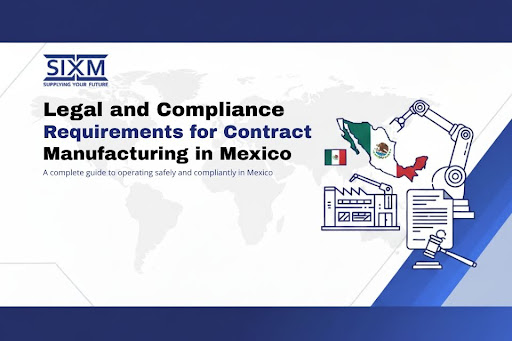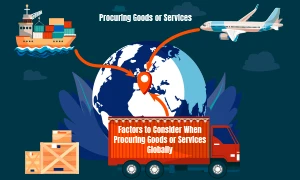
Mexico is one of the most attractive destinations for global manufacturers. But long-term success requires more than operational setup. It requires a strong familiarity with Mexico’s legal, tax, labor, and environmental framework to ensure compliant and efficient operations.
This guide outlines the key compliance essentials for contract manufacturing in Mexico. It explains how to choose the right legal structure, leverage IMMEX tax benefits, and manage labor, EHS, and IP requirements.
Contract Manufacturing in Mexico: Key Legal and Compliance Insights
As Mexico solidifies its position as a global manufacturing hub, businesses must understand its legal and regulatory framework carefully to ensure compliant, efficient, and sustainable operations.
Contract Manufacturing in Mexico: Key Legal and Compliance Insights
As Mexico solidifies its position as a global manufacturing hub, businesses must understand its legal and regulatory framework carefully to ensure compliant, efficient, and sustainable operations.
1. Entry Paths and Legal Structures
Before launching production in Mexico, it’s important to understand the legal structures available and how each impacts compliance, control, and cost.
1.1 Modes of Manufacturing Engagement
Foreign companies can engage in Mexico via multiple models:
Contract manufacturer model: You engage a Mexican manufacturer to produce goods under your specification, including your design/BOM, quality standards, and shipment responsibilities.
Shelter- or “maquila” model: Under a local partner’s legal entity, you operate production while your team manages operations and the partner handles HR, payroll, and compliance.
Standalone subsidiary or joint-venture: You incorporate a Mexican entity, obtain certifications, and manage the factory yourself (or with a joint partner).
1.2 Legal Entity & Ownership
Choosing the right legal entity and ownership structure is essential for smooth and compliant operations in Mexico.
Foreign investors may own 100% of a Mexican corporation in most sectors.
The choice of entity type (Sociedad Anónima, S. de R.L., etc.) and stock capital requirements must conform with Mexican corporate law standards.
Binding contracts (manufacturing agreements, quality/consignment agreements) must be drafted in accordance with Mexican civil law traditions.
Where you simply contract a CM and do not establish a Mexican entity, your contract must clearly define scope, IP ownership, liability, governance, and exit/transition terms.
2. Trade Program: The IMMEX / Maquiladora Regime
For production geared to export, Mexico offers the IMMEX (formerly Maquiladora) program which allows favorable tax and customs treatment.
Key requirements:
- You must obtain IMMEX authorization and register with the Secretaría de Economía.
- Maintain detailed records of temporary imports, exports, and ensure compliance with Annex 24 inventory software when required.
- Adhere to the program’s use-by-export or just-in-time obligations (components imported and exported within defined time frames).
- VAT (IVA) on temporary imports may be deferred or zero-rated under IMMEX certification.
- Failure to comply may lead to revocation of IMMEX status, loss of tax benefits, and penalties.
3. Customs, Import/Export and Free Trade Compliance
With trade programs in place, focus on meeting customs and export requirements to avoid delays and maintain preferential tariffs.
- Ensure correct HS/HTS classifications for goods, parts, and raw materials when moving through Mexican customs.
- For goods sold into the U.S. or Canada, satisfy origin criteria under the United States-Mexico-Canada Agreement (USMCA) to claim preferential tariffs.
- Temporary import of components under IMMEX must track quantities, stored location, consumption and re-exports. Inventory records must match declarations.
- Duty-free or reduced rates (border zone incentives) may apply in certain states, but compliance demands proper registration and record-keeping.
- Customs brokers and local advisors should be engaged to ensure you meet Mexican custom clearance regulations.
4. Taxation & Transfer Pricing
Tax compliance in Mexico goes beyond rates; it requires transparent reporting, proper documentation, and alignment with global standards.
4.1 Corporate Income Tax and Special Regimes
The standard corporate income tax rate is 30% for Mexican companies.
Under the IMMEX Safe Harbour regime for maquilas, taxable income may be based on (a) 6.5% of costs/expenses or (b) 6.9% of net assets.
4.2 Value-Added Tax (IVA)
The general rate of 16% applies to goods and services, including imports.
Under certain programs (IMMEX, border zone) VAT benefits or lower rates may apply for temporary import or border zone operations.
Monthly VAT filings and proper invoicing are mandatory; mis-matching inventory vs declarations can result in audits.
4.3 Withholding Taxes & Transfer Pricing
Payments of interest, royalties, technical assistance to foreign entities may incur withholding from 4.9% to 35%, unless reduced by treaty.
Transactions with related parties must comply with Mexican transfer pricing rules; documentation must follow OECD-aligned standards.
4.4 Payroll and Employer Obligations
State payroll tax (typically 2-3% of payroll) applies.
The employee profit-sharing obligation (PTU) requires employers to distribute 10% of profits before income tax to employees.
5. Labor, Employment & Social-Security Compliance
Strong labor compliance builds stability. Companies must meet wage, safety, and social-security obligations while managing outsourcing reforms.
The Secretaría del Trabajo y Previsión Social (STPS) enforces federal labor laws.
Standard full-time workweek is up to 48 hours (6 days of 8 hours each). Sunday work carries a bonus.
Overtime pay: First 9 extra hours = +100% wage; 10th hour +200% wage if more than 3 hours in a day or in a week.
No “employment at will.” Termination requires cause or severance pay.
Training programs, union relations, and joint committees (for companies >50 employees) are required.
Outsourcing reforms demand that specialized service providers register and follow certain rules, which is relevant if your contract manufacturer uses outsourced services.
6. Quality, Standards & Product Compliance
Consistent product quality is mandatory. Understanding NOM and NMX standards helps ensure market access and regulatory approval.
6.1 Mexican Official Standards (NOMs) & Voluntary Standards (NMX)
Certification under the Norma Oficial Mexicana (NOM) program is required in many sectors (electronics, automotive, medical devices, food & beverage) to certify safety, labeling, and environmental emissions.
NMX standards are voluntary but often expected by global OEMs and buyers.
In medical devices, for example, compliance with NOM-241/ISO 13485 is essential.
6.2 GMP, Traceability & Inspection
CMs must implement documented quality systems, first-article inspection, control plans, rework processes, and product traceability.
Buyers should audit the CM’s capabilities for measurement system analysis, process capability (Cp/Cpk), PPAP/FAI if applicable.
To learn more about how quality experts ensure consistent performance across the supply chain, explore our blog on How Supplier Quality Engineers Improve Product Reliability.
Labeling must comply with Mexican regulations if goods are sold domestically; export-only goods may have different obligations.
Failure to maintain certification, improper labeling or traceability issues can result in import rejection or recall liability.
7. Environmental, Health & Safety (EHS) Compliance
Environmental and safety compliance protects both workers and brand reputation. Proactive EHS systems prevent fines and downtime.
The Secretaría de Medio Ambiente y Recursos Naturales (SEMARNAT) regulates environmental permits, hazardous waste (NOM-052-SEMARNAT-2005), emissions, and water discharges.
Employers must comply with at least 41 NOM standards for workplace safety, health studies, emergency response systems, and hygiene in food/industrial systems.
Waste transport and disposal of hazardous matter require separate authorizations and tracking of quantities and vehicles.
Integrating an EHS Management System (ISO 14001/45001) is a best-practice and increasingly expected by global partners.
8. Intellectual Property & Confidentiality
Protecting IP and data is essential when manufacturing abroad. Strong legal protections preserve innovation and trust.
The Mexican legal system supports IP protection under VIDU laws and via registration with the Mexican Institute of Industrial Property (IMPI). Buyers should confirm the CM has IP safeguards, NDAs, restricted access to drawings, and confidentiality protocols.
When a CM is producing proprietary products, the contract must clearly state ownership of improvements, trade secrets, and rights to use.
Data privacy obligations under the Federal Law on Protection of Personal Data Held by Individuals (Ley Federal de Protección de Datos Personales) require secure handling of personal data, especially if manufacturing involves tracking employee data, customer warranties or telematics.
9. Insurance & Liability Management
Insurance and liability terms protect against accidents, product failures, and financial loss, which are key to sustainable operations.
Ensure the CM has appropriate liability coverage for product liability, environmental damage, and worker accidents. In the contract, specify indemnity provisions, recall support, and insurance minimums.
Define responsibilities for defects, returns, field failures, and warranty claims in your CM agreement.
10. Contractual & Commercial Terms
A clear contract defines quality, ownership, and exit terms, ensuring both parties operate with transparency and accountability.
When engaging a CM in Mexico, your contract should cover:
- Scope of work, specs, BOM, tooling ownership, material sourcing.
- Quality standards (AQL, CTQ), first-pass yield targets, warranty obligations, recall rights.
- Change control (ECO flow), substitution of components, obsolescence management.
- Ownership of tooling, jigs, and assets; buy-back or exit purchase obligations.
- Tax-benefit conditions under IMMEX or border zone incentives.
- Termination/transition rights: tool transfer, knowledge retention, ramp-down plan.
- Audit rights, compliance certifications, KPIs on quality, delivery, cost.
11. Ongoing Compliance, Audits & Governance
Compliance is continuous. Regular audits and reviews maintain control, transparency, and long-term regulatory alignment.
- Establish quarterly internal and external audits (tax, customs, labor, environmental, quality).
- Maintain enterprise resource planning (ERP) and inventory control systems meeting Annex 24 requirements.
- Use supplier portals and dashboards to monitor metrics: OTD, PPM, scrap, payroll compliance, VAT refunds.
- Continuous improvement: track corrective actions from audits, supplier performance reviews, and compliance status.
- Ensure annual renewal of IMMEX certification, VAT certification, labor registration, and import-export licenses.
12. Real-World Example: Automotive Electronics CM in Northern Mexico
A practical example shows how structured compliance and smart governance drive reliable, efficient manufacturing in Mexico.
A U.S. OEM partners with a CM in the Nuevo León region, serving under IMMEX export rules. Key considerations:
- Design transferred under NDA to CM; tooling built and owned by the U.S. OEM.
- IMMEX registration and Annex 24 inventory were implemented to track temporary imports/exports.
- Labour: 48-hour week managed, unionisation available but not mandated, overtime premium followed.
- Quality: AQL 0.10% 2.0, 0 PPM target for automotive tier-2. CM certified under ISO 9001/TS 16949, and applies NOM safety standards.
- EHS: Hazardous waste permit under NOM-052.
- Tax: Safe Harbour income tax 6.9% of assets applied, VAT exemption on temp imports.
- Governance: Monthly review dashboard on KPIs, and exit plan defined for tooling re-purchase in year 6.
Common Pitfalls & Red Flags
Knowing common compliance mistakes early helps prevent costly disruptions, penalties, and delays.
- IMMEX registration lapses or Annex 24 mismatches (risk loss of duty-deferral).
- Labor misclassification issues (e.g., undeclared overtime, unpaid profit sharing).
- Product not certified under required NOMs for exports (delays at customs).
- Lack of tooling ownership agreement or unclear exit rights leading to asset loss.
- Weak traceability or quality systems causing assembly defects or recalls.
- Environmental permit non-compliance or improper waste disposal leading to fines.
- Lack of IP protections or unauthorized manufacturing of similar products.
- Supplier fails to maintain VAT certification and delays refund claims.
- Contract lacks recall liability, tooling buy-back terms, or exit ramp-down plan.
Best Practices for Buyers
Successful manufacturers view compliance as a strategic advantage, building strong and sustainable operations in Mexico.
- Perform thorough due-diligence of CM: verify legal entity, labor compliance, environmental history, certifications, and prior audit results.
- Define tooling ownership and exit strategy in the contract before ramp-up.
- Structure governance: set KPIs (yield, PPM, OTD), audit schedule, escalation matrix.
- Build compliance calendar: track IMMEX renewal, VAT certification, NOM updates, EHS permits.
- Maintain dual-sourcing strategy especially for critical components.
- Use on-site quarterly compliance reviews (tax, labor, EHS, quality).
- Integrate an ERP system capturing customs entries, inventory flows (Annex 24) and traceability.
- Treat the CM as an extension of your supply chain: align cultural values, share training, and embed your quality system.
Explore how Mexico is emerging as a top destination for reliable, cost-effective apparel production in our blog, Why International Buyers Choose Mexico for Apparel QC & Sourcing.
Partner with SIXM for Compliant and Scalable Manufacturing in Mexico
Contract manufacturing in Mexico offers global companies an ideal balance of cost efficiency, skilled labor, and proximity to major markets. However, success depends on strict compliance with legal, tax, labor, and environmental requirements. By choosing the right structure (IMMEX, shelter, or subsidiary), protecting intellectual property, and enforcing strong contractual and audit controls, your operation can become a strategic advantage rather than a risk.
At SIXM, we help businesses build compliant, high-performance manufacturing partnerships in Mexico. Our expertise in sourcing supplier management, and operational compliance ensures every engagement delivers value, reliability, and long-term growth.

